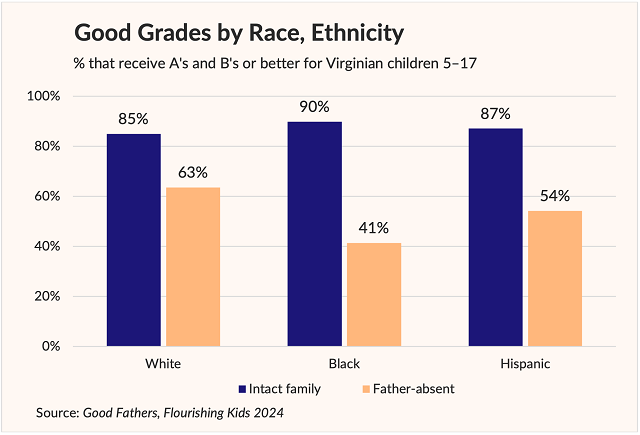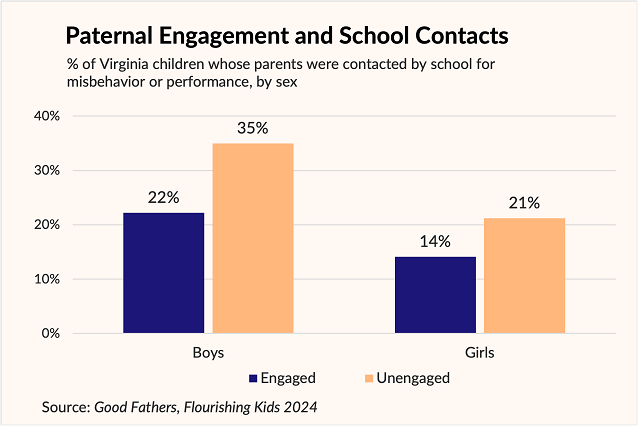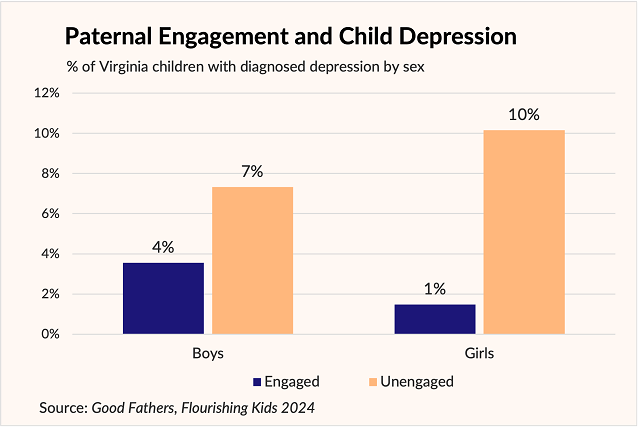Highlights
- Having an engaged dad at home has a positive impact on a child’s entire life, while an absent or disengaged dad can be disastrous for a child. Post This
- A new National Marriage Project report finds that dads seem to matter differently for girls and boys. Post This
- Dads who live at home spend 10 times as much time with their kids as dads who live elsewhere, per National Marriage Project report. Post This
This Father’s Day, an estimated 72 million greeting cards will zip through the mail, according to Hallmark. Father’s Day ranks a respectable fourth on the list of the highest “card-buying” holidays of the year. But it’s still far behind the next-highest: Mother’s Day.
Dads probably shouldn’t take it personally. People tend to feel more sentimental toward their mothers. But while public displays of affection might matter less to dads than to moms, a new report on the impact fathers have on their kids suggests we shouldn’t underestimate how much dads matter.
“Good Fathers, Flourishing Kids: The Importance of Fatherhood in Virginia” was released this week from a diverse group of researchers, including scholars from the National Marriage Project at the University of Virginia, the National Center for Black Family Life at Hampton University, and the American Enterprise Institute. By narrowing their focus to Virginia, these researchers created a real-world snapshot of the impact fathers have on boys and girls in one state.
They reached a strong consensus: having an engaged dad at home has a profound positive impact on a child’s life—for his or her entire life. By extension, an absent or disengaged dad can be disastrous for a child.
Roughly one in four Virginia kids is growing up without a dad at home. The report found these children are about twice as likely to be diagnosed with depression and three times as likely to have behavior or learning problems at school. They’re half as likely to earn good grades as their peers with a dad at home.
These statistics hold true across racial lines: more than 85% of kids living with a mom and dad at home will earn mostly A’s and B’s, regardless of their race. By contrast, Black and white kids living apart from their dads are far more likely to struggle.

This means that when it comes to the school success of Virginia’s kids, there is not so much a racial divide as there is a father divide.
Perhaps most strikingly, this new research finds that dads seem to matter differently for girls and boys. Social science has long found that family turmoil manifests itself more in “externalizing” behavior from boys—more fighting, delinquency and trouble at school—whereas for girls it shows up in more “internalizing” behavior—more self-harm, anxiety and depression.

This pattern is what we found in this new report. In looking at the difference in kids’ outcomes by how involved dads were, we found that boys with more involved dads are 13 percentage points less likely to get in trouble at school for behavioral or learning problems, compared to their peers with less engaged dads. But for girls, the difference is just 7 percentage points.
The story is mirrored when it comes to girls and depression. Girls with engaged dads are 9 percentage points less likely to be diagnosed as depressed, compared to their peers with less involved dads. By contrast, boys with less involved dads were just 3 percentage points less likely to be depressed. Clearly, good dads make for less-depressed girls and better-behaved boys in Virginia.

This new report is consistent with research indicating that dads are integral to the health of their families. Kids need their dad, mothers need a committed male partner in bringing up their kids, and dads need the grounding and meaningful responsibilities of fatherhood to flourish themselves.
Social science research has demonstrated the “father benefit” for decades. But what kind of dad makes the most positive impact?
“Good Fathers, Flourishing Kids” found that dads who are consistently involved in their kids’ lives confer a benefit on them even when mom and dad are no longer together. In other words, good dads can be found in a variety of family situations.
Kids need their dad, mothers need a committed male partner in bringing up their kids, and dads need the grounding and meaningful responsibilities of fatherhood to flourish themselves.
But the data also suggest kids whose parents live together in the same house (usually meaning they are married) experience dramatically better outcomes than any other arrangement. Dads who live at home spend 10 times as much time with their kids as dads who live elsewhere. And in Virginia, we find that married residential dads are about three times more likely to be highly involved with their kids, compared to cohabiting dads. Our report is consistent with the idea that children in intact, married families typically get the most attention and affection from their fathers.
On that front, there is some good news. The rate of unwed childbirth has leveled off, and the divorce rate has gone down, both in Virginia and the nation at large. Encouragingly, this means that about two-thirds of kids live with married parents in Virginia and across America.
To encourage more stably married dads and more engaged dads, the report’s authors included practical recommendations for Virginia leaders. These include improving education for boys — by hiring more male teachers, for example — to improve their prospects for growing up to become good family men, and expanding fatherhood classes for incarcerated dads. They also recommend teaching kids the “Success Sequence”: the fact that kids have a 97% chance of avoiding poverty as adults if they obtain at least a high school degree, get a full-time job after school and get married before having kids. Young adults who follow the sequence are also more than twice as likely to form stable families, which means they are markedly less likely to establish families where dad is absent.
In summing up the report, Richard Reeves, the president of the American Institute for Boys and Men and co-author of the report, said:
Dads matter. Fatherhood is a load-bearing wall—for healthy families, flourishing kids and for strong communities. States have a vital role to play in creating father-friendly policies, as we show in this report. For too long, the debate over fathers has focused too narrowly on financial issues, as if dads are little more than walking ATMs. But fathers are providers of love, time, energy and laughter as much as of money.
This Father’s Day, 72 million greeting cards will sum up the data in “Good Fathers, Flourishing Kids”: dads matter. Fathers are irreplaceable, and engaged fathers in particular can mean all the difference for our kids, minimizing the risk that our daughters end up depressed and our sons struggle in school.
Brad Wilcox is Distinguished University Professor of Sociology at the University of Virginia and the author of “Get Married: Why Americans Must Defy the Elites, Forge Strong Families and Save Civilization.” Maria Baer is a journalist and co-host of the “Breakpoint This Week” podcast with The Colson Center for Christian Worldview.
Editor's Note: This article appeared first at Deseret News and has been reprinted here with permission.










